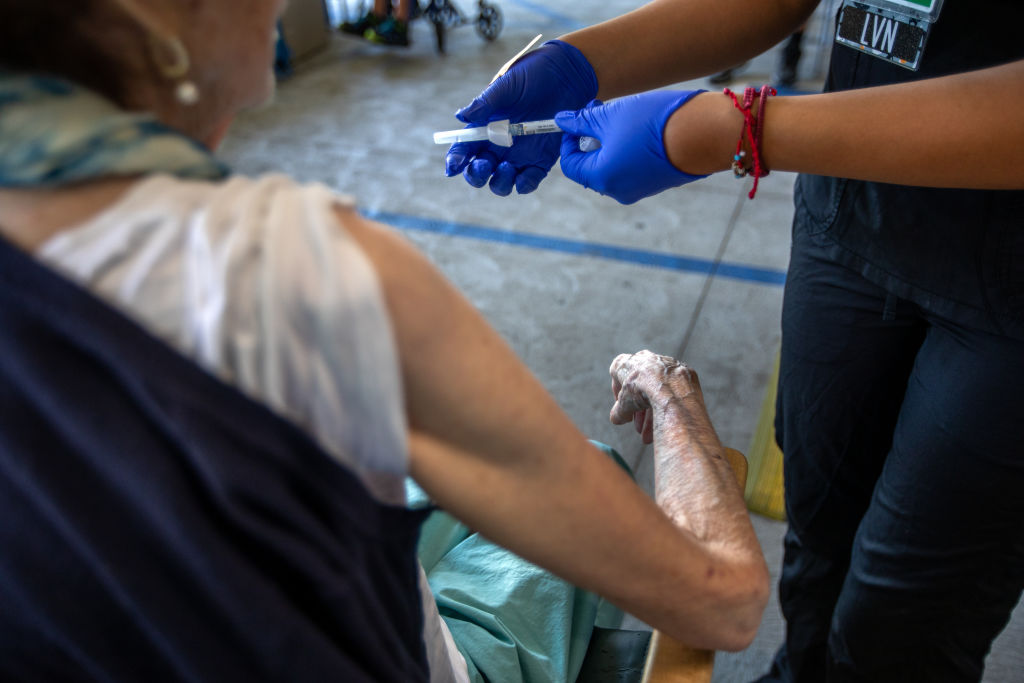
People vaccinated before their first case of COVID-19 are diagnosed with Long COVID almost four times less than unvaccinated people, suggests a large new study published Nov. 22 in the BMJ.
That’s not an entirely new finding. For years, studies have shown that, while vaccinated people can and do develop Long COVID, they are at lower risk than people who haven’t had their shots. But researchers have come to drastically different estimates about exactly how much protection vaccines offer against Long COVID, with their findings ranging from about 15% efficacy to around 50%.
The new study offers encouraging evidence that people who get vaccinated before their first COVID-19 case are at significantly lower risk of developing long-term symptoms like brain fog and fatigue, with each additional dose received prior to infection offering extra protection. A single pre-infection dose of one of the original COVID-19 vaccines reduced the risk of Long COVID by 21%, two doses by 59%, and three or more doses by 73%, the researchers estimated.
To reach those conclusions, they studied data from more than half a million adults in Sweden who caught COVID-19 for the first time from December 2020 to February 2022. National vaccine records showed that about half of those people had gotten at least one COVID-19 vaccine dose before they got sick, while the others were unvaccinated. Using the participants’ health records, the researchers then assessed who went on to be diagnosed with Long COVID during the study’s follow-up period, which ended in November 2022.
The study looked only at original COVID-19 vaccines, not newer boosters like the one released this fall. It also did not assess Long COVID after reinfections, which in some cases do lead to long-lasting health problems. As such, the findings may not translate perfectly to the present day, when many people have received updated shots and had COVID-19 multiple times.
Long COVID diagnoses were rare across the board during the study’s follow-up period, but even less common among people who’d been vaccinated before getting sick. About 1.4% of unvaccinated people received a Long COVID diagnosis during the study period, compared to 0.4% of previously vaccinated people.
Of course, there’s a difference between having Long COVID and being diagnosed with Long COVID. Many people with symptoms of the condition struggle to get formally diagnosed, and the study’s authors acknowledge that some clinicians may not have known how to assess the emerging condition during the period the paper considers. Indeed, prevalence estimates tend to be higher than those reported in the study. In the U.S., for example, an estimated 14% of adults have ever had Long COVID, and an estimated 5% currently do.
Further, observational studies like this one cannot definitively prove cause and effect, only uncover patterns. Even still, the trends reported in the study are promising, given that more than 5.5 billion people around the world have now received at least one dose of a COVID-19 vaccine.
In the study, vaccines were linked with particularly high efficacy against Long COVID in men, tracking with prior findings that women are disproportionately likely to develop the condition. Vaccines also seemed to work especially well for adults ages 55 to 64, contrary to some previous studies that concluded Long COVID risk increases with age.
Recent immunization also seemed to be especially protective against Long COVID, compared to vaccination more than four months prior to acute illness—which may be an extra argument for continuing to get boosters as they come out.
More Must-Reads from TIME
- Why Biden Dropped Out
- Ukraine’s Plan to Survive Trump
- The Rise of a New Kind of Parenting Guru
- The Chaos and Commotion of the RNC in Photos
- Why We All Have a Stake in Twisters’ Success
- 8 Eating Habits That Actually Improve Your Sleep
- Welcome to the Noah Lyles Olympics
- Get Our Paris Olympics Newsletter in Your Inbox
Write to Jamie Ducharme at jamie.ducharme@time.com